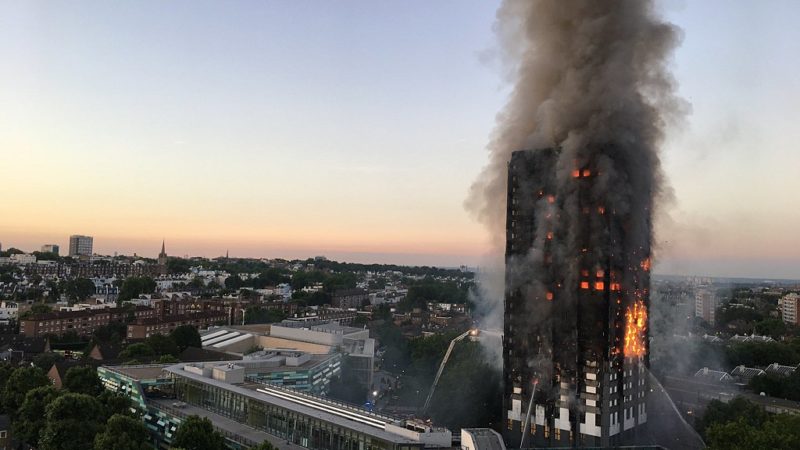Government deregulation bears the ultimate responsibility for the Grenfell Tower fire, a report reveals.

Government deregulation bears the ultimate responsibility for the Grenfell Tower fire, a report reveals.
A pamphlet by the Fire Brigades Union (FBU) details how deregulation by consecutive governments led to the tragedy.
The pamphlet will be launched at an event tonight at Labour Conference, with Jeremy Corbyn speaking, alongside Emma Dent Coad, MP for Kensington, Matt Wrack, FBU general secretary, and Gill Kernick, a former Grenfell resident and building safety expert.
Decisions made by every government since Thatcher led to the gutting of the UK’s fire safety regime and, ultimately, to Grenfell, as outlined in The Grenfell Tower Fire: A crime caused by profit and deregulation.
The report concludes that central government, over consecutive administrations, has failed to properly regulate high-rise residential buildings for fire safety.
It adds that the expertise of firefighters “has mostly been substituted with management consultants, industry lobbyists and chief fire officers.
“These agents have operated within a political climate that has emphasised the need for reducing regulation … driven by central government.”
Matt Wrack, FBU general secretary, said: “The terrible loss of life at Grenfell Tower was ultimately caused by political decisions made at the highest level.
“For at least 40 years, policies relating to housing, local government, the fire and rescue service, research and other areas have been driven by the agenda of cuts, deregulation and privatisation.
“Deregulation has been the dominant political ideology of most politicians in central government for decades. But it has also been fostered by the direct lobbying of private business interests.
“A deep-seated culture of complacency has developed regarding fire policy and fire safety and central government bears ultimate responsibility.”
The pamphlet meticulously covers the history of fire safety deregulation, starting with Edward Heath’s government removing a requirement for blocks of flats to have mandatory fire certification from the final Fire Precautions Bill 1970, due to the ‘very considerable expenditure’ involved.
In 1994, a review from the Major government again did not include high-rise residential buildings in its list of higher life-risk premises.
The Heath government ignored a recommendation that only those with ‘operational firefighting experience’ be responsible for enforcing fire safety, paving the way for privatisation of the fire safety regime.
The Thatcher government cut building regulations from more than 300 pages to just 25, ceasing a formal requirement to ensure buildings were ‘deemed to satisfy’ fire safety regulation, outlines the report.
A review from the Thatcher government called for an overhaul of fire policy due to the ‘significant financial burden’ of the legislation.
The review recognised that removing control would ‘lead to recurrence, albeit infrequently, of multiple fatality fires’. Nonetheless it advocated reductions in fire cover ‘which would not result in an unacceptable increase in loss of property or casualties’
The Major government privatised the Building Research Establishment, opening a conflict of interest between its role providing advice to ministers and its commercial role in testing materials for construction firms.
The Blair government in 2004 scrapped of the Central Fire Brigades Advisory Council, which governed fire safety from 1947 and delivered many of the major improvements in fire protection, and the abolition of national standards for fire and rescue services.
Cameron’s ‘one in, two out’ policy on new regulations slashed regulations further, with Eric Pickles, then communities secretary, repealing various local building acts’ fire safety measures.
The coalition government cut fire budgets by around 28% in real terms while ignoring warning from previous fires that raised risks seen at Grenfell, including the Harrow Court fire in 2005, the Lakanal House fire in 2009, and the Shirley Towers Fire in 2010, concludes the report.
Sophia Dourou is a freelance journalist




3 Responses to “Revealed: Government deregulation led to Grenfell tragedy”
Richard Malim
But surely it was ECM fresh regulations which were cheaper for the managers to comply with which were the cause. The Labour Party wd be wise to await the Inquiry findings before certain people end up with egg (or something a lot worse) on their faces. Jumping that gun is very very suspicious….
Ken Patterson
It helps if you say what you are talking about. Is ECM supposed to stand for European Council of Ministers? If it does you are arguing a very strange case since safety legislation “coming from Europe” is almost entirely risk-based regulation, levelling up to UK standards (pushed by the UK).
Fire safety regulations are almost entirely a UK matter which has been undermined by successive governments in exactly the way the FBU argues.
[I should say that in my working life I learned fire precautions at the Fire Service College at Moreton and have written fire certificates for major UK chemical plant].
Patrick Newman
Never mind complacency it is betrayal that should concern us all. Betrayal of the Grenfell residents and local community by the Inquiry, its Chair – Sir Martin Moore-Bick – and of course the government! The government are culpable for the mortality of residents as they preferred to have a bonfire of regulations instead of avoiding a bonfire of 72 people. There is no excuse because they were told about the dangers by the coroner of the Lakanal House fire (see:- https://www.lambeth.gov.uk/… ) and May’s current Chief of Staff was tasked to do something when he was a Croydon M.P. and minister but did f-all all about it. The Inquiry is being managed by Moore-Bick to avoid the embarrassment of the government by delaying the first phase which will then delay the second phase which deals with the causes of the faults with the cladding which will not be published until well into the next decade! Some in the industry are still fighting a rearguard action to water down any regulations.